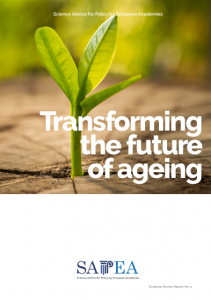SAPEA Report: The challenges of ageing must be faced by the young
A new SAPEA report looks into the future of ageing. It reviews the best evidence available and assesses how different public policy options might help EU countries to achieve inclusive, fair and sustainable health and social care in the future.
Society must tackle the challenges presented by ageing in every generation – not leave them until old age. This is the key conclusion of a major new Evidence Review Report entitled Transforming the Future of Ageing, published today by SAPEA.
The report is destined for the desks of the new European Commissioners expected to take office later in 2019. It reviews the best evidence on what public policies might help EU countries to achieve inclusive, fair and sustainable health and social care in the future.
The authors, leading scientists nominated by academies across Europe, conclude that the ageing process needs to be transformed – and that the best way to improve life outcomes in old age is to anticipate and tackle them in youth and middle age.
Among the report’s other headline conclusions are:
• Ageing in the future will take place in a very different context from the past and will be profoundly affected by phenomena such as climate change, air pollution and antibiotic resistance, as well as ongoing social changes. Policies will only be successful if they are able to accommodate these changes.
• Age-friendly communities enable older people to feel secure and to go about their daily life comfortably. Architects, urban planners, experts in mobility and ergonomics, social care experts and geriatricians must cooperate to make age-friendly communities the norm.
• Technology, including wearable and assistive devices and the advent of AI, is already changing the experience of ageing, and could transform it if barriers of acceptance and practicality can be overcome.
Further information and the report itself are available on SAPEA’s website.



